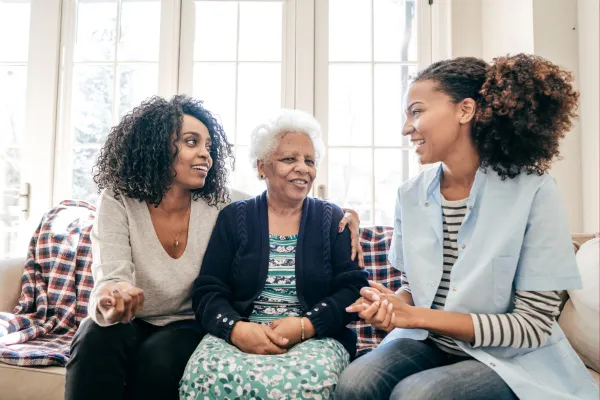
Blog

Self-Care Strategies: Balancing Your Needs with Caregiving Responsibilities
Introduction
Caregiving for a loved one with dementia is a demanding and emotionally taxing role that requires a significant amount of time, energy, and compassion. While it’s natural for caregivers to prioritize the needs of their loved ones, neglecting their own well-being can lead to burnout, physical exhaustion, and emotional distress. Striking a balance between caregiving responsibilities and personal self-care is not just important—it’s essential for sustaining your health and providing the best possible care. In this blog, we’ll explore self-care strategies designed specifically for dementia caregivers, offering practical advice on how to maintain your own well-being while fulfilling your caregiving duties.
Self-Care Techniques

Setting Boundaries
One of the most challenging aspects of caregiving is learning how to set and maintain boundaries. Caregivers often feel an overwhelming sense of duty, which can make it difficult to say "no" or carve out personal time. However, without clear boundaries, it’s easy to become overwhelmed and lose sight of your own needs.
Here are some strategies for setting boundaries:
Define Your Limits: Be honest with yourself about what you can realistically handle. Determine how much time and energy you can devote to caregiving without compromising your own well-being. Communicate these limits clearly with family members, healthcare providers, and even the person you are caring for.
Schedule Personal Time: Set aside specific times during the day or week that are dedicated solely to your personal needs. This could be as simple as a daily walk, time to read a book, or a regular night off. Treat this time as non-negotiable, and don’t be afraid to ask for help or delegate tasks to others to ensure you get it.
Learn to Say "No": It’s okay to decline additional responsibilities or requests that would stretch you too thin. Saying "no" when necessary is a powerful act of self-care that helps preserve your energy and focus on what’s most important.
By establishing and maintaining boundaries, you protect your personal time and space, making it possible to recharge and continue your caregiving responsibilities without becoming depleted.
Prioritizing Health
Your physical health is the foundation of your ability to provide care. Unfortunately, caregivers often put their own health on the back burner, leading to exhaustion and illness. Prioritizing your health is not a luxury; it’s a necessity that enables you to be an effective caregiver.
Consider these tips for maintaining your health:
Get Enough Sleep: Sleep is essential for physical and mental well-being. Aim for 7-8 hours of quality sleep each night. If caregiving responsibilities disrupt your sleep, explore options for respite care or enlist the help of family members to give you a chance to rest.
Exercise Regularly: Physical activity is a powerful tool for reducing stress, improving mood, and boosting energy levels. Even short bursts of exercise, such as a 10-minute walk or a quick yoga session, can make a big difference in how you feel.
Eat Nutritious Foods: A balanced diet rich in fruits, vegetables, lean proteins, and whole grains provides the energy and nutrients your body needs to function at its best. Avoid relying on caffeine or sugary snacks to get through the day, as they can lead to energy crashes and mood swings.
By prioritizing your health, you ensure that you have the physical and mental stamina needed to meet the demands of caregiving. Healthy habits also set a positive example for the person you are caring for and can improve their overall well-being as well.
Hobbies and Interests
Engaging in hobbies and personal interests is an important aspect of self-care that is often overlooked by caregivers. Pursuing activities you enjoy provides a much-needed mental break from caregiving and helps maintain your identity outside of your caregiving role.
Here’s how to make time for your hobbies:
Revisit Old Hobbies: Think about the activities you used to enjoy before you became a caregiver. Whether it’s painting, gardening, reading, or playing an instrument, try to incorporate these hobbies back into your life.
Explore New Interests: Caregiving can be an opportunity to discover new hobbies or interests. Consider trying something new, like a cooking class, photography, or a craft project. New activities can provide a sense of accomplishment and joy.
Join a Group: Participating in group activities related to your hobbies can also provide social interaction and support. Whether it’s a book club, a fitness class, or a community group, engaging with others who share your interests can be a refreshing change from caregiving duties.
Pursuing hobbies and interests is not just about leisure; it’s a crucial component of self-care that helps you recharge, reduce stress, and maintain a sense of balance in your life.
Benefits of Self-Care

Reduced Burnout
Caregiver burnout is a state of physical, emotional, and mental exhaustion that can occur when you neglect your own needs for too long. Burnout can manifest as feelings of helplessness, irritability, and detachment, and it can severely impact your ability to provide care. Regular self-care practices can significantly reduce the risk of burnout by allowing you to recharge and maintain your energy levels.
By incorporating self-care into your daily routine, you create a buffer against the stresses of caregiving. This not only helps you avoid burnout but also ensures that you are in the best possible condition to care for your loved one.
Enhanced Caregiving
It’s often said that you can’t pour from an empty cup. When you take care of yourself, you are better equipped to take care of others. Self-care enables you to be more patient, compassionate, and attentive, qualities that are essential for effective caregiving.
When you are well-rested, nourished, and emotionally balanced, you can approach caregiving tasks with greater clarity and focus. This leads to better decision-making, more effective problem-solving, and a more positive caregiving experience for both you and your loved one.
Emotional Balance
Caregiving can be an emotional rollercoaster, with highs of joy and connection, and lows of frustration and sadness. Without proper self-care, it’s easy to become overwhelmed by these emotions. Regular self-care practices help you maintain emotional balance and resilience.
Techniques such as mindfulness, meditation, and journaling can help you process your emotions and keep them in check. By taking time to reflect and care for your emotional needs, you build resilience that allows you to navigate the challenges of caregiving with greater ease and grace.
Improved Relationships
Taking time for self-care can also improve your relationships with those around you, including the person you are caring for. When you are less stressed and more balanced, you are likely to have more patience and a more positive attitude. This can lead to more harmonious interactions and a stronger emotional connection with your loved one.
In addition, maintaining your social connections outside of caregiving is vital. Spending time with friends and family, even if just for a quick phone call or a coffee break, can provide emotional support and help you feel more connected and less isolated.
Conclusion
Balancing your own needs with caregiving responsibilities is not just important—it’s essential for your health and well-being. By implementing self-care strategies such as setting boundaries, prioritizing your health, and engaging in hobbies and interests, you can reduce the risk of burnout, enhance your caregiving abilities, and maintain emotional balance.
Remember, self-care is not a luxury or an indulgence; it’s a necessary part of being a caregiver. By taking care of yourself, you are not only ensuring your own well-being but also providing the best possible care for your loved one. Make self-care a priority, and you will find that both you and the person you care for will benefit greatly.

